Cannabis Health spoke to Chelsea Leyland and the team behind a moving new documentary highlighting two sisters’ fight for fair access to medicinal cannabis.
Chelsea and Tamsin Leyland both have an incurable condition, but living on two sides of the Atlantic, only one has been able to benefit from medicinal cannabis.
Tamsin has lived with treatment-resistant epilepsy since she was a baby, sometimes experiencing up to 70 seizures a day. Later, at the age of 13 Chelsea also began experiencing seizures and was quickly diagnosed with Juvenile Myoclonic Epilepsy (JME).
Today, Chelsea, a DJ-turned founder and activist, lives in New York and has been seizure-free for seven years thanks to using medicinal cannabis oil daily from a local dispensary.
But back in the UK, Tamsin lives in full-time care under the NHS, where her neurologist insists it would be unethical to prescribe cannabis, despite other experts believing there’s a good chance that it could help her.
A long-awaited documentary about the sisters’ story is due to be shown at the UK Medical Cannabis Patient Conference next month, following its UK premiere at Raindance film festival.
Created by a female-led team, including director Caroline Sharp and producer Sophie Daniel, Sisters Interrupted is about the fight for medical cannabis on the NHS, but it’s also a look at the unconditional love and bond between two sisters in the face of huge injustice.
Read the full interview with Chelsea, Caroline and Sophie below.
CH: Caroline, for anyone who doesn’t know this story already, can you share a bit of an overview of what Sisters Interrupted is about?
Caroline: This particular film is about two sisters whose parallel lives took a sudden and radical fork when Tamsin’s epilepsy became so debilitating that she had to live under full-time care. At the same time Chelsea, her younger sister, enters her teen years and only later discovers she too has a form of epilepsy, albeit a different version. Both sisters suffer from the profound side effects of epilepsy medications, which can have severe consequences on one’s quality of life in the name of prioritising seizure reduction. For Tamsin, these medicines became increasingly ineffectual, whilst Chelsea, then in New York, took matters into her own hands and was able to try medical cannabis for the reduction of her seizures. The film lands in the present moment when Chelsea joins a fight to try to gain access to this medication for her sister who, under NHS care, has not been able to access the drug due to legislation limitations in the UK. We follow this fight and the intimate relationship of the two sisters as time starts to run out for Tamsin.
CH: Chelsea, what life was like growing up with a sister who had epilepsy?
Chelsea: Tamsin is five years older than me and was always an amazing older sister to have because she was so naughty, which was the part of her condition that had no filter and not much self-awareness. We went to the same primary school that actually accepted children with special needs and Tamsin was just the ultimate rascal. It was really around the age of seven that her epilepsy began to get unmanageable and at that point she went away to a boarding school for children with disabilities. I was always the cognitively healthy sibling, as it were, until I started getting symptoms around the age of 13.

Chelsea and Tamsin growing up. Photo courtesy of Chelsea Leyland.
CH: Can you share what happened when you started to experience symptoms yourself?
Chelsea: I remember travelling in the car and this dappled light would be coming through the trees, sort of flickering on my eyes and giving me this very strange sensation – it was like a little interruption in the brain. I now know this to be a myoclonic jerk. They began to become more frequent and I would get clusters. I went to my doctor many times before eventually he sent me to a neurologist. At that first appointment, I was very quickly diagnosed with JME.I can experience three different types of seizures: a tonic clonic seizure which most people know as a typical kind of epileptic seizure when you fall to the ground and lose consciousness, but I also have what’s known as auras and the myotonic jerks.
CH: …And that must have been a huge blow for you and your family?
Chelsea: It was a very challenging and painful bomb that was dropped on my family, especially for my parents to have one daughter with such severe epilepsy, only to then have another one with a very different type of epilepsy. Although epilepsy does affect Tamsin and I very differently, at its worst I was having one tonic clonic seizure a year.
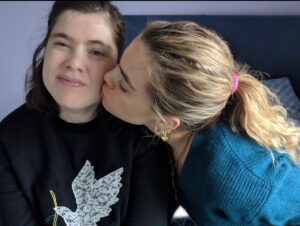
Tamsin (left) and Chelsea Leyland
CH: How does epilepsy affect you and Tamsin differently today?
Chelsea: Tams and I live very different lives. For the most part, I’m living a normal life and unfortunately that isn’t the case for her. Tams has severe frontal lobe brain damage from repeated trauma to the brain and having up to 70 seizures a day sometimes. She struggles to dress herself, she can’t bathe herself and she takes a lot of medication. She doesn’t have a good quality of life. She’s very aware of how challenging and how difficult her life is and she openly says that she wishes she didn’t have epilepsy. That makes it very difficult as a family member to see her suffering as she does.
Tams is hospitalised once or twice a year and every time she’s hospitalised, we have to grapple with the idea that we might lose her. For my sister, in many respects, time is not her friend.
CH: Medicinal cannabis has played an important part in allowing you to live a normal life, when did you first discover it helped?
Chelsea: I was introduced to medical cannabis about eight years ago. I didn’t know a lot about it, but I was put in touch with a friend who was campaigning in the UK. I was given a full-spectrum CBD product and it was almost instantaneous that I noticed a positive impact on my epilepsy and overall health. When I started using cannabis it was as though I was Humpty Dumpty – I had been in little pieces and somebody had put me back together. It was like I had been plugged into the power socket. I could finish thoughts more easily, my whole system felt more grounded. I started using it daily and every day that I used it my memory improved and I felt a sense of calm.
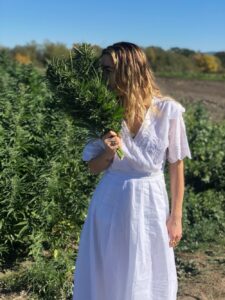
Chelsea was first introduced to medical cannabis around eight years ago.
CH: How did it change things for you?
Chelsea: In the beginning it was mostly the anti-anxiety effects and improvements to my sleep and insomnia. Being epileptic causes a lot of anxiety, knowing that you can have a seizure from stress and lack of sleep is a terrifying thing to experience on a daily basis.
I used it for six months and every week I felt different elements of my health improving. At the six month mark I decided – against everyone else’s advice – that I was going to try and wean off my anticonvulsant medication. I didn’t have the support of my neurologist and I would never recommend anyone go about this process unsupervised, but I did it gradually and as responsibly as i could having seen my sister weaning on and off drugs throughout my life I’ve now been off anticonvulsants for seven and a half years and touch wood, I’ve not had one tonic clonic seizure.
CH: You’re now based in New York where cannabis was recently legalised for adult-use, how has it become a part of your life?
Chelsea: This medicine had such a profound impact on my condition which is why I began this advocacy work because I wanted other people with epilepsy who could benefit from it to know about it and those without access to have the ability to use the most therapeutic and efficacious solution for their condition without having to fight there way through bureaucratic hurdles. It is an understatement to say that cannabis impacted my life – it gave me my life back. I feel so fortunate to have found this medicine and there has almost been something spiritual to this experience and the profound impact it’s had on my life.
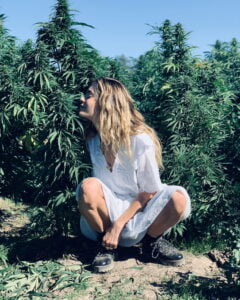
Chelsea says medical cannabis is now part of her daily life.
CH: Knowing the transformative effect it’s had for you, how does it feel that Tamsin has not been able to access this?
Chelsea: It feels unjust that I have access and Tamsin doesn’t and it’s very, very hard to make sense of why we’re denying patients NHS access to this medicine within the UK.
We have spoken to a number of different experts who have said that because we are sisters and because it has had such a therapeutic impact on my epilepsy, there is a strong chance that it could be efficacious for Tamsin as well. So why would we not try it?
CH: What do you understand about why patients like Tamsin haven’t been able to access this treatment, even though medical cannabis has been legal in the UK since 2018?
Caroline: We were lucky enough to be filming at the time legislation changed in the UK – November 2018 – yet despite this change at the legislative level, there has yet to be a trickle down of real implementation into the NHS and in terms of access. As Tamsin lives in full-time care under the NHS and the financial pressure for private full time care would be too difficult for her family, she must have the full supervision and sanction of the doctors who make the decisions for her medical regime. It’s difficult to point the finger in any one direction, but the change has had little widespread institutional effect and medical attitudes can still be very sceptical, no doubt due to a lack of support and validation from the governing bodies.
Chelsea: When the legislation changed, we thought all of our hard work, and that of everyone who came before us, had finally paid off. I naively thought that the end of the documentary would be my sister gaining access. It is so brutally sad to be sitting here in 2023 and still to this day there are only five patients with access to the NHS.
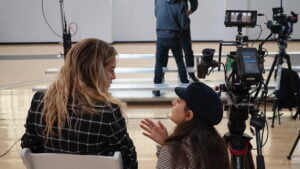
Chelsea (left) and Caroline on set.
CH: How did you all find the experience of making the documentary?
Chelsea: I found it extremely challenging given how personal the nature of the project was and also due to the fact I had kept my own condition hidden from others for so long and the same goes for Tamsin, in that not many of my friends had met or been a part of her life so whilst in moments it felt cathartic it simultaneously felt exposing and terrifying.
Caroline: This was a deeply personal film for all of us, and as with many creative endeavours, there were moments where there was no boundary between your personal life and that work you’re doing. I think giving yourself so fully to something, living, breathing and believing in the message so profoundly is something I’ll take with me always, and was a very special experience. We all gave so much of ourselves because we went in as filmmakers first, but quickly the activism component became the core driving force.
It wasn’t an easy film that came together quickly, it was a long process of capturing hundreds of hours of footage and always chasing to catch up with the story. It could have gone in many directions but ultimately it was the intimacy and love of the sisters at the core that really drew us in and became the focus and centrepiece for the wider issues in the film. For me, tackling medical injustices and particularly epilepsy awareness have become indelible in my life’s journey. I’m now working in the medical technology sector, looking at how we can use AI and novel imaging techniques to improve the lives and treatments of conditions such as epilepsy.
Sophie: Making Sisters Interrupted was extremely challenging, like any independent film but I couldn’t be happier with the final product. Working on this film has taught me to never give up on making something you truly believe in.
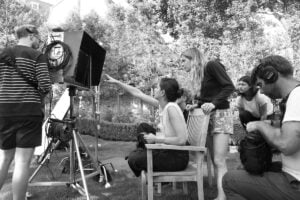
Caroline Sharp and Chelsea Leyland whilst filming Sisters Interrupted.
CH: And finally I guess, what do you hope will come from it?
Caroline: If this film can help galvanise the public towards supporting the more widespread adoption of medical cannabis that would be a win. If by watching this film we help people with epilepsy to speak to their friends and feel more confident that they’ll have support, then that would be a huge win. If someone with no prior experience of epilepsy sees someone have a seizure in the street and can run towards not away from the sufferer, then that would be the biggest win of all.
Sophie: We are hopeful that a UK broadcaster will pick up this film and spread the word about this medical injustice, whilst at the same time, giving a rare opportunity to explore this common medical condition/epilepsy more deeply.
Chelsea: Our number one desire as a family is to see Tams in a place where she’s not suffering. She has been unwell for so long that we are not expecting miracles. We are not sitting here saying that just because cannabis has worked wonders on my health, it will have the same impact on Tams’. We just want the opportunity to try it.
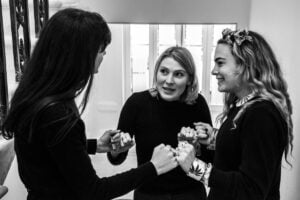
From left: Caroline Sharp, Sophie Daniel and Chelsea Leyland.
Caroline and Sophie will take part in an exclusive Q&A following the screening of Sisters Interrupted at the UK Medical Cannabis Patient Conference on Friday 3 November. Find out more and get tickets here
The post Chelsea Leyland: “It’s unjust that I have access to medicinal cannabis but my sister doesn’t” appeared first on Cannabis Health News.
Go to Source
Author: Sarah Sinclair

